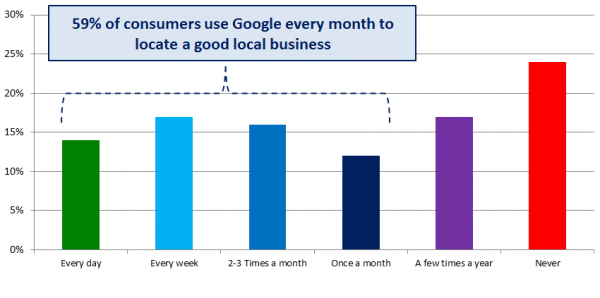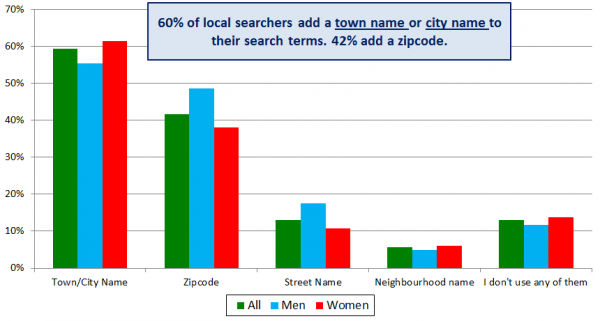How Users Search For Local Businesses + 5 Tips To Optimize Local Listings
In a recent staff meeting, it emerged that the most regular question our customer support agents get asked by our customers* is: “When we track our local search rankings, how much should we focus on search terms that include a local term (e.g. town name, ZIP code) vs. generic keywords without the local term?” From […]
In a recent staff meeting, it emerged that the most regular question our customer support agents get asked by our customers* is:
“When we track our local search rankings, how much should we focus on search terms that include a local term (e.g. town name, ZIP code) vs. generic keywords without the local term?”
From a local search optimization point of view, it’s essential for local businesses to include local terms (aka “geo-modifiers”) in their site content and link building activities. Google needs to know where you’re located and which areas you serve in order to return your business as a search result for a relevant, local search.
What interested us more about this question was searcher behavior. Specifically:
- How do searchers go about their search for local businesses?
- Do most searchers use local modifiers or not?
- Do searchers expect to get local results for a generic, non-local search term?
I let one of my team loose on the issue for a day, but we couldn’t turn up any research on the subject, at least nothing that answered our specific questions.
So we put these burning questions to our local consumer panel and got back some very clear answers.
This panel consists of 1,250 “local consumers” based in the U.S. (broad mix of ages, gender and location). We received 1,081 responses to this survey; here are the answers we got back.
How Local Consumers Use Google Every Month To Find A Local Business
How Searchers Value The Information Contained In Local Search Results
And of these, 60% of searchers said that local listings with a photograph grab their attention more than standard listings.
Tip for local businesses: To really stand out in local listings, you should choose an eye-catching photo as your main profile image. Therefore you need to claim and enhance your Google Places listing and put your best photo front and center.
How Searchers Use A Local Modifier Such As Town Name, ZIP Code
The survey also shows that 17% of searchers never use a local modifier in their search terms, with this percentage rising to 21% among younger searchers. However, older searchers are more inclined to add a local modifier to their search terms — 63% usually do.
Tip for local businesses: This finding should not alter what you optimize for (i.e. local terms are essential for Google to know where you are located) but it does gives a clear answer to the original question our customers asked. When monitoring your search rankings:
- If your business targets a younger audience, you should focus more on generic search terms (and let Google handle the localization) rather than track search terms with local modifier.
- If your business targets older consumers, then the opposite is true: Focus more on search terms with local modifiers.
Just 6% Of Local Searchers Add A Neighborhood Name
Tip for local businesses: Optimizing for town name and city name should deliver more traffic than ZIP code; but a well-rounded local SEO campaign should utilize both. It’s interesting to see how few people search by neighborhood.
But even though many searchers don’t use neighborhood terms, Google can identify searcher location down to neighborhood level and return hyper-local results to them. Therefore, you should include neighborhood terms on your site, but not make them a priority.**
**Note: This won’t be the same for all neighborhoods so you should conduct some keyword research for your neighborhood before making any decision to downgrade your neighborhood optimization.
Male Searchers Use ZIP Codes; Women Favor Town Name & City Name
(see chart above)
Tip for local businesses: If your business targets male consumers, make sure you emphasize ZIP code prominently in your optimization efforts; conversely, if you’re a female-focused business, your priority should be on optimizing for town and city name.
13% Of Searchers Use Street Name Within Their Search Terms
This result particularly intrigued us, so we conducted some qualitative follow-up calls/emails with some panel members.
We discovered that people generally use street names when they’re looking for a specific business — i.e. they know the business name and its location but they are looking for contact details, driving directions or some other specific piece of information.
Tip for local businesses: Optimizing for street name may not win you many new customers, but it does mean that you’ll make it easy for existing customers to keep coming back. It’s essential to have your street address on your Contact Us page and ideally across all pages on your website. Also, make sure it’s machine-readable and not placed in an image file.
Searchers Expect Google To Return Local Results Based On Their Location
As location-based services become more widespread and consumer adoption grows, so we expect people’s expectations of “localization” to increase.
Duncan, a member of our local consumer panel, sums up this behavioral shift:
“It just makes life that little bit easier. I don’t need to think ‘do I need to tell Google where I am?’ No, Google knows and gives me search results that are local to me. It saves me the hassle,” Duncan, 23, Tucson AZ.
As it stands today, the majority of local consumers are more comfortable using local search terms within their searches, and it (hopefully) delivers the results they’re looking for.
For most local businesses, the optimal optimization strategy (i.e. time vs. ROI) should ensure that they reach both town-name searchers and ZIP-code searchers. For those with the time and budget, you can even go down to neighborhood and street level.
* To clarify, these are BrightLocal customers using the Local Search Rank Checker tool.
Contributing authors are invited to create content for Search Engine Land and are chosen for their expertise and contribution to the search community. Our contributors work under the oversight of the editorial staff and contributions are checked for quality and relevance to our readers. The opinions they express are their own.
Related stories
New on Search Engine Land





